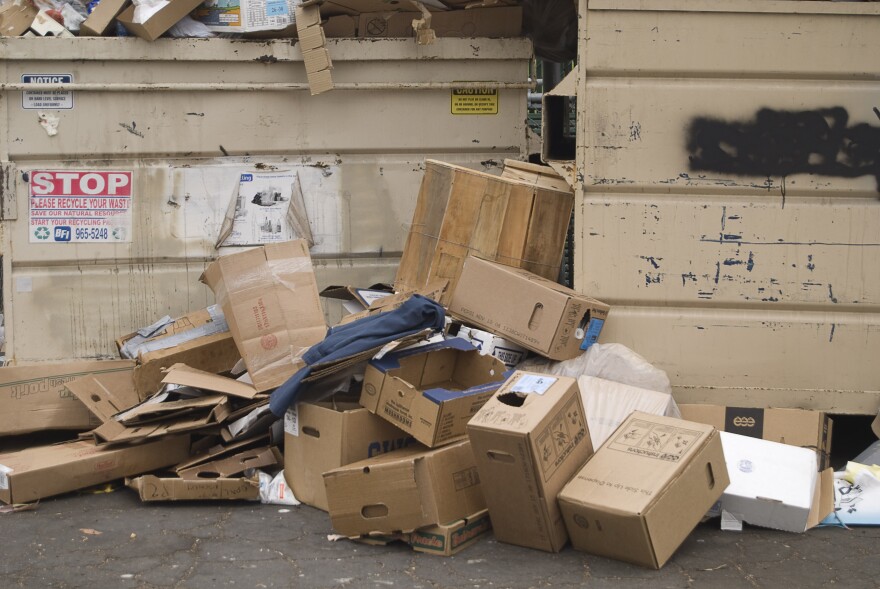San Luis Obispo County's regional waste management authority faces an uncertain future. The Board of Supervisors recently voted to withdraw from the Integrated Waste Management Authority, or IWMA.Then their interim director, Paavo Ogren, resigned. KCBX's Benjamin Purper spoke with San Luis Obispo Tribune reporter Lindsey Holden about her reporting on the IWMA.
Purper: Lindsey Holden, reporter for the SLO Tribune, thanks for joining us.
Holden: Thanks for having me.
Purper: So, let’s start with Paavo Ogren, who was briefly the interim director of the IWMA. Can you tell us about his departure?
Holden: Yeah, so Paavo resigned from his position a few weeks ago after the County Board of Supervisors voted to pull out of the IWMA, which is the Integrated Waste Management Authority, and his departure happened the day after the county voted to withdraw from the organization.
Purper: So, what is the current status of the IWMA then?
Holden: So, the IWMA is in a bit of turmoil, as my recent story said, because the county pulling out will change things quite a bit in terms of the organization. They’re going to have to kind of figure out where they go from here in terms of membership, whether all of the seven cities and different communities that are part of the organization will remain, how their funding structure will continue and basically how they are going to continue to function as an organization. They’ve gone through a lot of leadership turnover with Pavo’s departure, and then their previous director resigned suddenly as well. So, they’re trying to figure out how to move forward as an organization.
Purper: How will cities and community services districts, or CSDs, manage waste regulations post-IWMA?
Holden: So, the IWMA’s job is basically to manage solid waste regulations with the state, making sure all the different communities are compliance with state waste disposal regulations, and so, all the different cities and communities rely on the IWMA to do that. They don’t do that in-house with their own staff, and so, the IWMA do that on an economies of scale basis, so with more members, the fees required to pay for that are cheaper. So, they’re going to have to figure that out, and that’s a bit unclear at this point. There was a study that the county commissioned to look into the impacts of them leaving the IWMA, and that only looked at garbage rates for unincorporated communities. It didn’t look at how that would affect rate payers in cities. So, there’s a lot that’s up in the air right now.
Purper: I understand the county will have to hire more staff?
Holden: Yes, the county will almost certainly need to hire more staff. The study said they would need about five more staff members, but the County Public Works is right now looking into ways that they could save people money. Hopefully, bills wouldn’t have to go up as much as the study suggested, so that’s also under consideration right now.
Purper: How could this affect peoples’ bills?
Holden: I mean, the study showed that unincorporated customers, people living not in areas where they’re not in a city or they’re not part of a CSD – there are also some CSDs that haven’t activated their solid waste authority that includes Los Osos, that’s probably the biggest CSD that hasn’t done that yet – so on the low end, that study showed that residential customers could see their bills go up by 9.7% or $3.71 per month. And, on the high end, they could see their bills go up by about 12% or $4.63 per month. So, that’s just for people who’d be directly impacted by the county leaving the IMWA. In cities that’s unclear right now. The study didn’t show that, but there probably would be a difference, because, like I mentioned, the economies at scale with fewer members, that might be expensive for the people who are still there.
Purper: So, what’s next in your reporting? What are you looking out for next?
Holden: So, during the last IWMA meeting, there was a lot of frustration on part of the members who were there. They were pretty angry about the county’s decision and kind of figuring out how to move forward. So, they decided to look for an interim director for their organization. Right now, the deputy director is overseeing a lot of things, and the county actually, today at their Board of Supervisors meeting, they just are trying to set a date to formally pull out of the organization, which a lot of the members what them to be clear about – when they’re leaving, how this is going to happen. They also are looking to potentially negotiate receiving some of the funds that they’ve contributed over the years to IWMA. So, some of the other members were kind of redescent to give them a payout as they’re leaving the organization. So, there’s a lot that still needs to be decided.
Purper: Alright Lindsey, thanks so much for joining us. I really appreciate it.
Holden: Yeah, thank you so much for having me.





